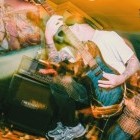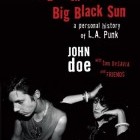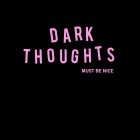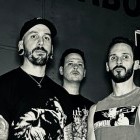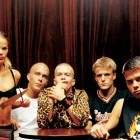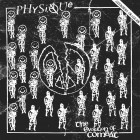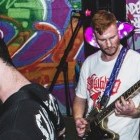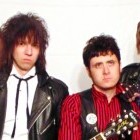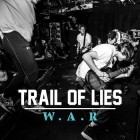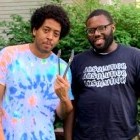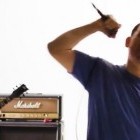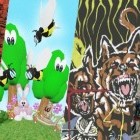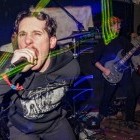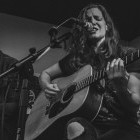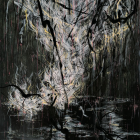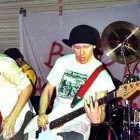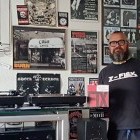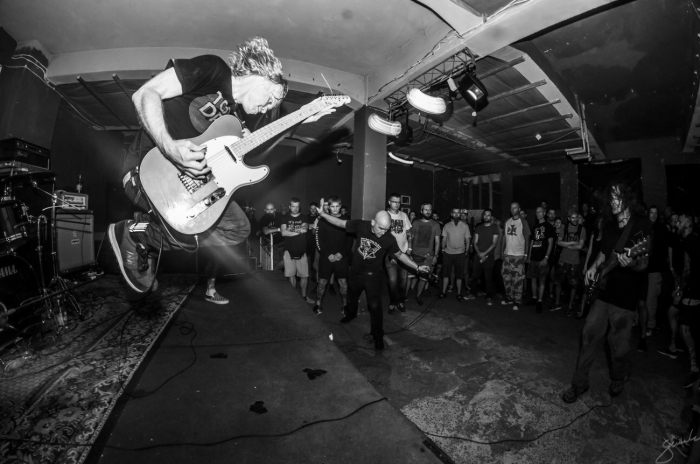
I grew up idolizing the music of Duncan Barlow and Rob Pennington (proclaimed by me as the "Cappo and Porcell of the Midwest"). Endpoint, By the Grace of God, and Guilt records were in constant rotation growing up and stories of their shows were something of legend. Unfortunately, I never got to see any of their bands live, but my wife and friends that were fortunate enough, promise me I would not have been disappointed.
Out of respect for their positive impact on my life and countless others, I’d like to honor the one-half of this dynamic duo. An accomplished artist, author, publisher and lecturer at the University of South Dakota, Duncan has over 30 years of contributions to music, art and literature. A portfolio worth celebrating!
It’s January 2020 and the “Holi-daze” are over. It’s a shut-in Saturday and the first real Northeast Ohio snow has me sitting at my laptop listening to Duncan Barlow’s latest release, Colony Collapse, a perfect score to my afternoon coffee. A sort of melancholy masterpiece that evokes both excitement and sadness. It's an ultrasonic journey, both fresh and somehow familiar. As I stare out my window at the two feet of pure white snow, nothing in particular is bumming me out at the moment. My current soundtrack is just a simple reminder that it’s ok to feel overwhelmed sometimes.
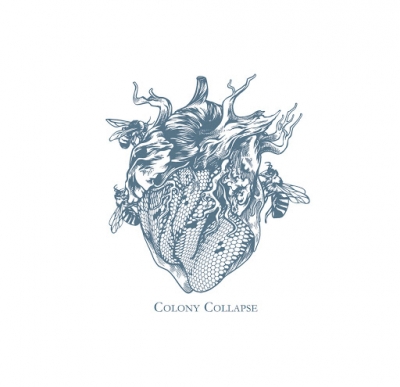
I missed my target date of Nov. 26 for this interview, the one-year anniversary of my first article for No Echo with Duncan’s longtime friend and bandmate Rob Pennington. I have about half a dozen other things to finish or even start for that matter. Work is always rough this time of year and I really wanted to go to the gym this morning, I really did. Being cooped up in the house dredges up thoughts of regret, opportunities lost, and time wasted. But, as he sings through my earbuds “we’ve got to find a way to keep it together if we’re ever gonna make it to Spring," I’m assured, it’s all going to be fine.
So, take a cold deep breath, another sip of java and let's make the best of the time we have, shall we?
Thank you so much for taking the time to do this interview, Duncan.
It's my pleasure, Jason; I appreciate taking time to do this.
Let’s talk new music first. I am digging the new record. Very different from the songs I grew up listening to and associate with you. Tell me a little bit about how it came about and the inspiration behind Colony Collapse.
I believe there is a logical path to what I’m writing now but not something everyone knows. I published music that wasn’t punk anonymously or under the moniker of d.biddle for years. When I first decided to release other genres of music, I didn’t want to use my little successes in hardcore as a springboard. At the time, I thought that might be disrespectful to a scene that has been so important to me. I never judged people for doing it, but it just didn’t feel right for me.
This new record is the first album where I’ve used my name. I felt perhaps enough time had passed and this record was distinctly personal. Colony Collapse was a bit of an experiment. I wanted to write a record in a short period of time at my house and have musicians contribute a few parts remotely.
I’d gone through a rather tough relationship and break up and began thinking about the absurdity of how tumultuous it felt in that moment. It was a response to that, a narrative beginning with optimism and descending into sadness, with a touch of humor. I wrote and recorded most of it in a couple weeks and then began collecting parts from contributors and mixing about a year later. The school year came, and I had two books coming out, so the record went to the back burner. Then I sat on it longer because I didn’t know if I wanted it to be released. Someone talked me into releasing it eventually.
One thing I always appreciate is your ability to do multiple bands in different genres all while maintaining the integrity of each project. Is that something you are always aware of?
I’m really glad you think so. It’s something I try to do. Respect the music and listen to what it tells me to do. Though I love a good story, and if you catch me at the right time, I’ll tell stories about the old days, I’ve always found the future far more interesting — the bleeding edge of what’s to come. For me, that means always trying new things with music and writing.
I’m not a talented musician. There are people around me who are real players, just born to play at a high level. I have a slow and heavy hand. But I think I have a pretty decent ear for writing. I’ve always been more interested in the heart of the song, how it creates a sympathetic resonance with the listener.

First things third, what can you tell me about Rob’s angry cat?
I met Rob after the cat, I believe. He adopted a Calico while in college and a one-legged chicken and a pig. The pig was mean to everyone but Rob. I once walked into his house and Rob Scott was in a screaming match with the pig, yelling “I fucking hate you pig.”
Did you grow up in Louisville, KY as well and what got you into music and the punk/hardcore scene?
I did, though from a very different area than Rob. Though his parents were country people, they bought modest mid-century house on the edge of the preppy suburbs. It was a disguise really because they didn’t fit in. Rob was like a platypus had somehow been born in world of ducks. I lived most of my pre-teen life in a nice house in the beautiful Cherokee Park area, but my father went broke in '83 and our lives changed drastically. We had a rental home and really struggled to get by. Before that things weren’t great.
My parents were alcoholics and not giving me a lot of guidance. I was failing out of school and started acting out. Punk came at a great time.
My gateway into was a video channel called LRS-TV10. It was an attempt by the local rock radio station to break into the future of cable tv years before MTV. However, not many rock bands had videos, so they’d play videos from British and American punk and post punk bands. The Clash, the Ramones, Adam and the Ants, Gary Newman, etc. My sister and I connected with it, she babysat and had money, so she’d go out and buy records. Eventually she brought home a Black Flag record that she wasn’t crazy about, but it changed my life. It was the first time that music inspired me to make a conscious decision to take control of my life.
Sure, the other stuff resonated with me, but Black Flag spoke directly to me. From there I found Circle Jerks, Hüsker Dü, Dead Kennedys, and very quickly into Teen Idles and less “famous” bands. I was a boy obsessed.

I have Rob’s side of this, but do you remember how you guys met?
Reading Rob’s answer took me back. I’ll fill in the lines a bit. A couple guys from Maurice would take me to this teen club parking lot. At the time I didn’t realize it was so they could meet girls. I really didn’t want to go - teen clubs were awful. I met Rob, but we didn’t connect. He looked a little preppy at the time, and I was really just wanting to hang with the friends I came with. After that, we had some chance meetings at shows and such and I did in-fact kick him and said something to the effect of “skank fucker,” because the kids weren’t dancing to my shitty band. As you can imagine, Rob was a very hyper kid.
Once we were in a car together to see Murphy’s Law, Fishbone, and Beastie Boys and I was terrified he was going to get us killed downtown. I think he actually did get punched when he tried to start a pit. I kind of kept my distance that night. In the summer, Bill Danforth came to town and we were riding in the back of a friend’s truck to skate along with him, but they ditched us. Rob and I had two or three dollars between us, so we bought some Ho-Hos and a jug of lemonade. As his friend drove us around the city looking for skate spots, Rob and I got to know one another.
At some point, we were in the suburbs and there was an old man mowing the lawn in all white, using an antique lawn mower. The old guy was waving at us as we stopped at a sign. Rob and I looked at one another and started pelting him with melted Ho-Hos as we pulled away. I still see it in slow-motion, his friendly wave turning to a fist. I think that’s what brought us together. A kind of innocent mischief.
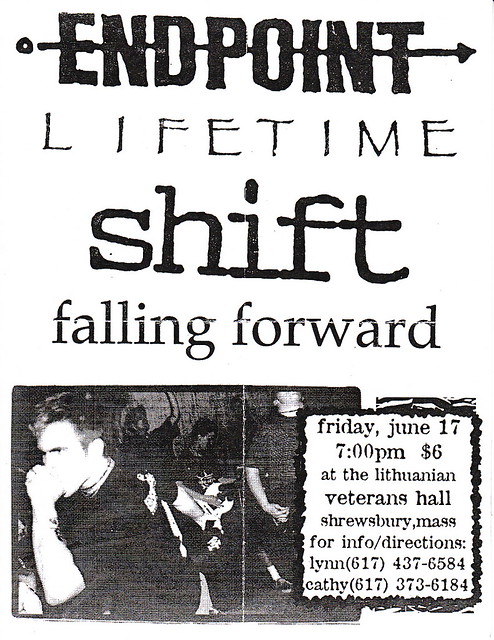
Who were your influences and what do you feel makes your writing so prolific?
That’s a tough one because I’ve always been a sponge for music and the arts in general. In the early days of Endpoint, I was inspired by a lot of punk, hardcore, and metal bands. Louisville was a fiercely local scene so Malignant Growth and Maurice were big influences, but nationally it would have been Rites of Spring, Battalion of Saints, Necros, Metallica, and eventually Youth of Today. You can definitely here those influence on If the Spirits are Willing. I always loved Echo and the Bunnymen and Devo too but didn’t have the chops for that stuff. By the time I was 17, I began listening to a much wider range of music and collections of found sounds and always had some side bands going on that satisfied my other ambitions in one way or another.
Hearing new music always inspires me and I buy a few records a week, scour the web for playlists, read widely to see what’s on the edge, what’s coming that will make me see the world in a new way. I’ve always had a problematic relationship with writing music and to some degree writing fiction. My theory has been that it’s rooted in a deep anxiety that developed in my youth. I’m dyslexic and in the early '70s it wasn’t commonly diagnosed, so I was failing out because I couldn’t read, and kids were calling me stupid and sort of harassing me. I mean, I was a redheaded kid with a lazy eye named Duncan who had a learning “disability” — I was a walking bullseye for zingers and eventually punches. Even a nun made fun of me at that school.
I started developing physical reactions to the anxiety, stress and depression that were uncommon for someone my age. A psychologist eventually advocated for my parents to send me to an experimental school for Dyslexic students and that was a life saver. A good many of those insecurities still linger at the strangest places.
I do think artists, good ones anyway, wrestle with insecurity and anxiety. I’m more secure with fiction writing, I think, though I do always want to edit something until my publisher yanks it out of my hand. Though Rob’s story is different, I think childhood anxieties propelled him as well and his productivity stayed with him in the way they stayed with me. The guy is one of the most inspiring people I’ve ever met and at this point, he feels as much a part of my life as my right hand. He challenged me in ways I couldn’t have expected and I’m better for it. I remember an example of this from May of 1987. I was on the cusp of failing a math class.
I’d expressed worry to Rob, who was quite good with numbers. He offered to help me study. However, that morning a few friends and I stole a van from someone’s mom and drove to Cincinnati to skate this spot where urban legend had it GSD invented the boneless. When I got back home, Rob was at my house with Algebra books and forced me to study. I had tried to cancel on him, but Rob wouldn’t have it. I eventually became a good student, I promise, but up until about 1989, I was primarily interested in skating and playing punk music. Rob was always structured and responsible and I think that rubbed off on me eventually.
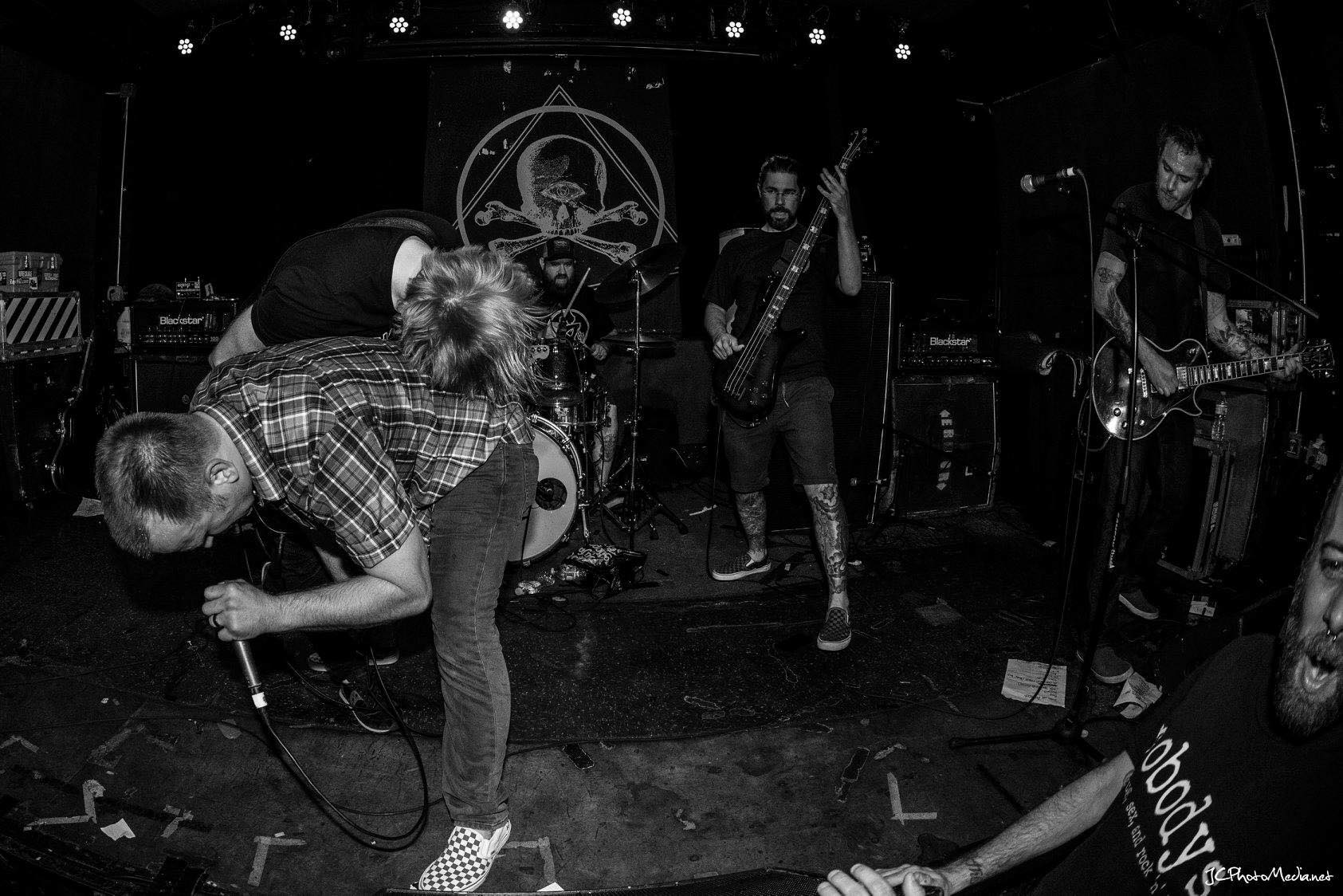
Was there ever a time you didn't get along?
I don’t think so. I mean, we could fight about things, but we’d usually make up quickly. It’s hard to be in a band in your teens and early twenties. Everyone is precious and delicate and trying to navigate the turbid waters of adolescence and adulthood. Rob and I had some blow outs on tours, but it never lasted. Now, it’s usually just that he’s a morning person and I’m a scallywag when I wake up, so we talk a lot of shit to each other when loading into the tour van. But we really don’t fight.
Could you expand a little bit on Dyslexia and how it relates to playing music? Was it harder? Or in a sense, easier because it was all by ear?
Sure. My Dyslexia began manifesting early in life. I struggled with language and organization. I would, for example, say lello instead of yellow, which my parents found adorable, but the preschool and kindergarten teachers thought I might have a speech impediment or a cognitive issue. There were other early signs such as the constant unkempt state of my room that often found me forging paths through my room to get to the door. My parents would ground me until I cleaned it, but it never stayed clean.
When I started grade school, they grouped students into units 1, 2, 3 (essentially advanced, regular, and slow). I was quite good at sight-reading (learning the general shape and length of words and making guesses) but I wasn’t really able to read. Like many Dyslexics I’d use contextual clues to get through when prompted, but eventually they removed me from my reading classes and sent me to the basement where the children who weren’t performing well worked with a special intervention team, or LD team as the students often referred to it. They were, for the most part, very nice down there. The head of that team took me under her wing and was eventually the person who was instrumental in having me tested. The school sent a priest over to our house to talk my parents out of changing schools.
By sixth grade, the school was letting me fail. There was a science teacher (who was also the football coach of a local high school) he really seemed to have it out for me because I wouldn’t do the absurd punishments, he assigned me when I failed tests or homework assignments. He ended up getting violent with me, which wasn’t uncommon for Catholic schools in the 70s and 80s. It was during one of these corporal punishments, that the head of the intervention team came into class and pulled me out to shelter me. My parents enrolled me at DePaul the next day. Within a year of attending my new school, I read A Tale of Two Cities. It wasn’t easy, but I was determined to read something literary. I also learned the mantra an organized room equates to an organized mind and so my journey of organization and cleanliness began. I’m a bit obsessive about it these days.
When the psychologist told my parents that I tested very highly on the intellect tests were a bit skeptical at first, like he’d mixed up the files. They found that I excelled in areas related to cognition and logic, as well as creativity. I taught myself to play guitar by sight, going to shows and memorizing hand positions and then applying them at home later that night.
If it hadn’t been for music, I think I’d have been much more neurotic, and my self-esteem would likely be terrible. Specifically, punk saved me. It gave me confidence to forge my own way, to see roadblocks and dead ends and say, “fuck you, I’ll do it myself."
My fascination with language stemmed from lyrics, but also from a kind of stubbornness that I’d be damned if I’d let something defeat me, so I was determined to master it. I can’t be the judge of how successful I’ve been, but I’m hoping it’s not too badly.
I’m a total gear head. What’s the story behind your maroon LP Custom and do you still have it?
I do. Just had it brought back to life after years of being thrown and bent and bitten and, on one occasion smashed into the head of a Nazi in a German squat. I started off as an SG guy but got tired of breaking SGs when I breathed on them, so I bought a beautiful brown '70s Artisan when we got back from our first European tour. Got it for a song, maybe $500.00. I bought the '84 Custom in '93 when Endpoint was at the peak of our popularity. I didn’t want to hurt the Artisan, which weighed as much as two Customs if it weighed a pound. I ended up selling the Artisan because a roommate stole two months of my rent when I was on tour.
No way are you getting out of telling me about smashing a Nazi with that guitar?!
{Laughs] Yeah, a lot of Nazi stories, I guess. This one happened in some East German city during the 1997 BTGOG tour. We rolled up to this squat, (proper squat with period-blood-soaked mattresses they’d found in dumpsters and some mad-scientist guy making dinner that I don’t think anyone ate) and discovered that a Nazi skinhead band was on the bill; we asked the promoter to take them off the bill. The promoter agreed, but they didn’t kick the guys out.
They stood upfront in their uniforms and flexed, which I found problematic, so during one song I pulled back the neck of my guitar, jumped, and cracked him on the head with the headstock. They left right after that, which was pretty surprising. The machine head was bent almost perpendicular, but I managed to get it straightened out enough to tune; never changed it for some reason. My luthier found that story a bit crazy, I think.
Crazy indeed! Any other favorite stories from the road?
Seeing friends has always been my favorite part of touring. Hardcore, man, it’s really like a big strange family. You can meet a person for one night in 1992 and return twenty-five years later and it’s like no time has passed at all. It’s a beautiful thing. The only reason I have social media is to keep in touch with my hardcore and punk friends around the world. As for trouble, we seemed to seek it out. I’ll write a memoir one day and I’ll have to find a balance between the chaos and reflection of the touring years. If anyone wants to hear a particular story, they can always ask me. I tend to be pretty honest about it all.
Best show/worst show?
So many to choose from, Jason! I do recall a very bad show for Guilt at Middlesex in 1996. Our friend tuned Matt’s guitar to E and I think we played two songs before realizing what was going wrong. We never recovered from the embarrassment and left a little heartbroken by the show. The next night we played with Converge in Syracuse I believe, which went much better, but to a much smaller audience. There have been more good shows than bad ones.
I’ve been very fortunate to play music for people and I’ll never take it for granted. I’m honored to have the opportunity and I love the people around me when I do it. I think when I was an angry guy, sort of ruled by my depression and anxiety, I thought every show was awful. Even on the best nights, I’d pick apart everything that went wrong. Now, every show is a good one. It’s just a pleasure to play.
Give me your Top 3 favorite songs from your personal discography. Mine are "Remora," "Black Skies," and "Omega."
Hmm, of hardcore-related bands, I suppose:
Endpoint - “Caste” from Catharsis
Guilt - "Untitled” (the song after the introduction) from Further
By the Grace of God - "Cole” from Perspectives
Other music:
d.biddle - “The Light That Disappeared” from Rabbit and the Moon
Duncan Barlow - “What Can Love Me Like You Do” from Colony Collapse
The Lull Account - “Hurricane” from 001
***
Colony Collapse is available now from Eastwood Records. Ducan Barlow's social media pages: Official site | Bandcamp | Instagram
Tagged: by the grace of god, duncan barlow, endpoint, guilt

